Not to detract from the reviews of many excellent books that follow, but this has been a lousy month for the UK comics scene. Zainab Akhtar is arguably the most insightful comics critic in the country, and in the last couple of years has moved into publishing with her peerless ShortBox series of collections. Earlier in October, following an observation she made about the Lakes International Comic Arts Festival lineup lacking in diversity, she ended up on the receiving end of a considerable amount of abuse.
The initial response of the festival organisers was extremely unprofessional, followed up with an “I’m sorry if you’re upset” tweet before eventually issuing a statement of unreserved apology some 24 hours later. For many this was too little too late, and several exhibitors cancelled their appearances in solidarity. Zainab was accused of bearing a grudge following her experiences of racism in Kendal in 2014. One can only assume the festival organisers did not read her account of attending in 2015.
Of course, this being 2017, the bigots of Twitter proceeded to deluge her with racist and Islamophobic messages until she closed her account. You can read more about this from Kim O’Connor. It’s a small scene in this country. Zainab is someone who not only writes sharp, no-bullshit criticism to bring great comics to our attention, but now goes so far as to commission, publish and ship out boxes of brilliant work by underexposed, often marginalised creators, that will come through your letterbox and enrich your life. If you don’t already get them, sign up for ShortBox emails and buy some of the books and if you want to support her criticism, sign up for her Patreon. It’s never been more important that we don’t stand by and let bigotry drive important voices out of the conversation.
Anders Nilsen – Tongues #1
(No Miracles)
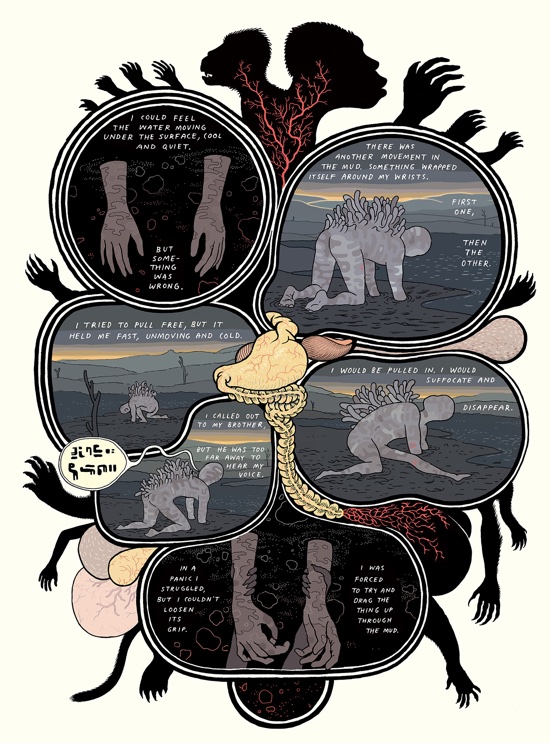
Tongues #1 is the first in a new self-published series from Anders Nilsen. The format is striking: a slim 48 pages of A4, full colour, with French flaps and inserts. I mean, it’s not Chris Ware levels of trolling his printer, but the challenge of reproducing it must have been roughly inverse to the pleasure of holding the finished object. Nilsen makes excellent use of this space, whether employing multiple panels or a single, evolved image of the sort seen in his sketchbooks. With two trailing zeroes for single digit page numbers, the implication is clear – this is going to be a substantial work when it is finished.
Characters so far include bird or two, a monkey and a deity. Significant humans are a 13-year-old girl whose errand is to save the world and a bitter and incompetent man, ill prepared for his walk in the desert. He’s miles from anywhere, with no food, water or plan, although he does have a teddy bear strapped to his back in a way familiar to the artist’s longstanding readers.
This comic benefits hugely from the luxurious size, tactile in a way that draws you in to the detail. I’ve often felt that the patterns Nilsen employs everywhere are like fractals; if we could zoom in closer we would see more of the same. Sometimes motion is represented by showing the same character multiple times in different positions within the same frame, allowing the images to be kept large while still conveying the movement of time of several panels.
There’s no resolution here. Several narrative strands emerge, but it’s all opening up and only the girl and the monkey appear more than once. Compelling, beautifully drawn and in a way that takes full advantage of the format, this series is going to be something special. I’m not sure whether it’s available from any UK retailers, but it can be ordered from his website, as can a process zine with sketchbook pages of development. Pete Redrup
Noah Van Sciver – Fante Bukowski Two
(Fantagraphics)
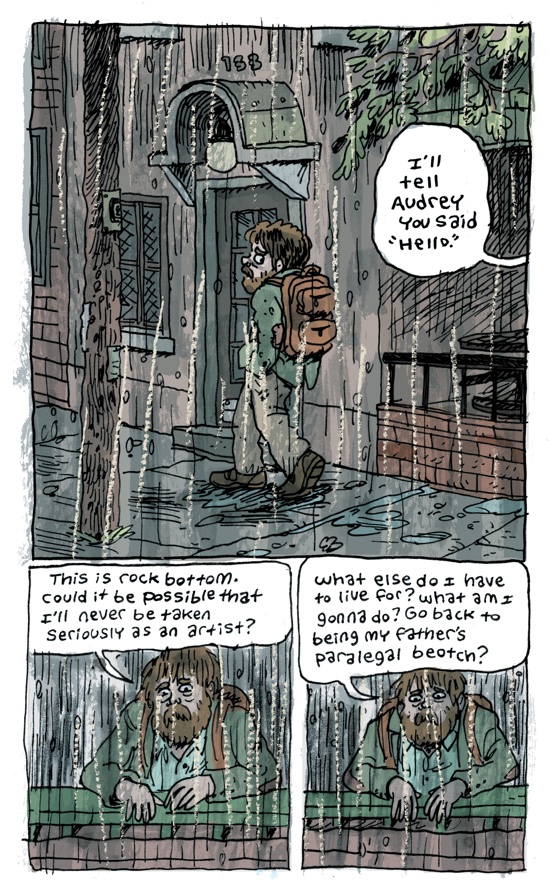
Before we get to the reasonably important consideration of what is inside, it is necessary to pause awhile to note that this is probably the finest piece of book design this year. It’s exceptional, and full of little details that can’t help but raise a smile. Should you be less inclined to fetishise the printed object, or even to read digitally, rest assured the contents are of a similarly high standard. We left Fante Bukowski alone in the woods at the end of the first book, but a year later he’s moved to Columbus, Ohio. He rents the Presidential Suite in a scuzzy motel, named after a serial killer arrested there, the president of murder, with a running gag about his stolen jacket which moves from low life to lower life.
Fante Bukowski Two is Noah Van Sciver’s funniest work by far, littered with deadpan humour. It’s particularly amusing when he’s writing about writing – once again Bukowski mutters bitterly about the ‘jock editors’ who reject his work (complete with stereotypical non-jock editor picture). Van Sciver gives himself an extended cameo (just in case any readers might be thinking Bukowski might be a stand-in, perhaps) with jokes about how he wishes he was writing Marvel Universe stories. Van Sciver is very, very funny about writing and writers in general.
There are also plenty of sharply depicted incidental encounters, such as the man who approaches ex-girlfriend Audrey as she writes in a coffee shop, first trying to fawningly charm before quickly turning aggressive and hateful, the depiction of the irony-free angry young white males of the internet we read all too much about these days. The art is superb – this is a story that particularly suits the way he draws characters, but there are also some fabulous full-page images of architecture and street scenes, with simply beautiful colouring. Van Sciver just continues to get better and better – you need this book. Pete Redrup
Areeba Siddique – Musings Of A Muslim Hipster
(ShortBox)
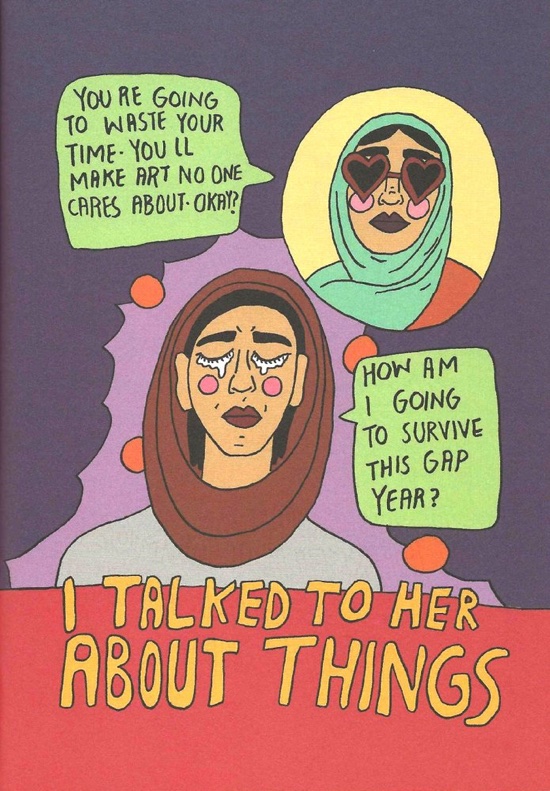
In the past I’ve not reviewed any comics from ShortBox, as by the time they ship the boxes have sold out; I can be mean, but not so much that I’m going to write here about great comics you can’t buy. It took me a while to notice and process the fact that individual books are now available to purchase via the ShortBox website, so here’s a great comic you can buy.
Musings Of A Muslim Hipster presents a selection of pieces from Pakistani artist and activist Areeba Siddique. The book is subtitled A Collection Of Artwork, and it’s a series of iterations of her character, expressing a state of being, and a badass one at that. In her ever-present heart-shaped sunglasses, Siddique tells us about being female and Muslim, filtered through internet culture. “My hijab is none of your problems xoxo."
The snapshots of a series of moments and thoughts achieves an instant rapport as we see the things Siddique tells us about her family, her faith, being a woman, and, in a series of pages about an imaginary friend, what she fears. It’s an honest, open expression of being, a pleasure to read and an important work in the way it forces empathy by staring straight at the reader on almost every page. You don’t have to be a Muslim hipster to connect with this, just human. Pete Redrup
Mimi Pond – The Customer Is Always Wrong
(Drawn & Quarterly)
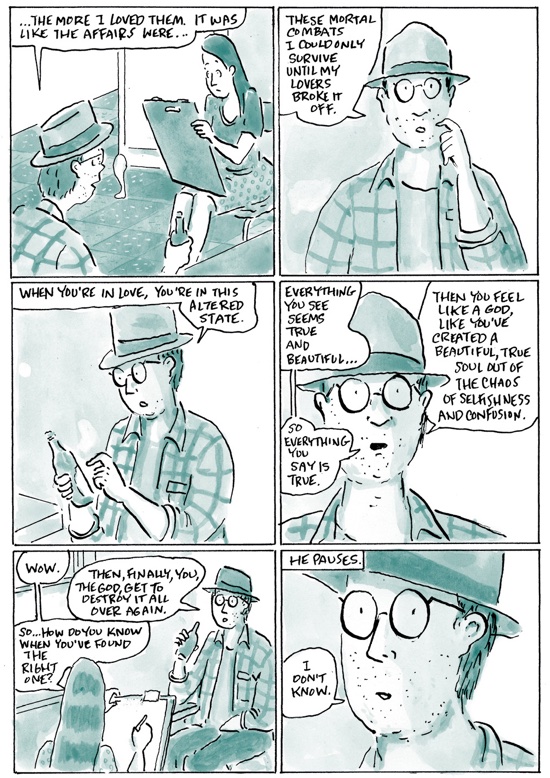
Mimi Pond’s The Customer Is Always Wrong is set in Oakland in the late 70s. Madge is a waitress in a diner by day, and a budding cartoonist as well. Everything centres on the diner in which she works, with a close-knit bunch of coworkers making up most of the characters we encounter. Read the first couple of pages and you might form some ideas about the tone this book will take. Pond’s faces suggest an innocence that is misleading – this coming of age story, based on her own experiences, is far from gentle. The people in her immediate circle are drawn into serious drugs, there are coercive relationships, threatened and actual violence and much more. The fluid line and gentle green washes soften this a little, but this is not 450 pages of Happy Days.
The book is an engrossing read with much excitement and a good range of characters but also numerous moments of reflection and insight. It’s an extremely well paced narrative, balancing darkness with light, honesty with wit. Madge and her friends are a tight group of colleagues, exploring what it means to be real friends over and over again.
Although the book is full of the moments of awfulness inevitable for any group of people, particularly those who live on the margins of society, recovery is swift and life goes on. When something truly upsetting happens – as mundane, predictable, but terrible as death is, Pond shows the way that in the moment of pain, all the sadness you’ve ever experienced before seems like nothing in the face of true grief. Warm and witty (I’m always a sucker for Bowie references, and there are some great ones here, hilariously so in the final chapter), this is a book about friendship, and the transient, impermanent nature of life. I thought it was excellent. Pete Redrup
Alexis Deacon – Geis: A Game Without Rules
(Nobrow)
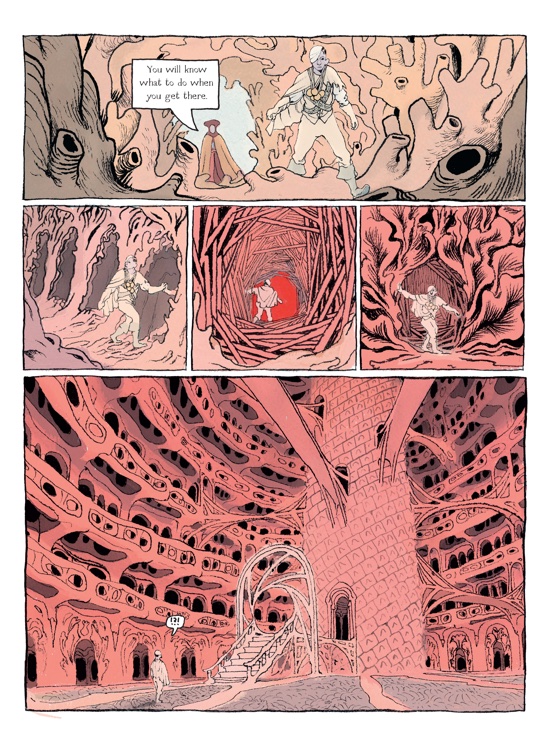
Expectations are high for Geis: A Game Without Rules, the sequel to one of the strongest titles Nobrow have published. In the first book we saw the opening 24 hours of a competition to find a successor to the deceased chief Matarka, as arranged by the sorceress Niope. Here, the second test begins as those who survived the first are divided and left to fight. Niope’s plan is quite brilliant, a logical challenge requiring the players to first work out elliptical instructions and then reason their way ahead through riddles and paradoxes. Nemas, so ruthless and self-serving in the first book, becomes much worse here. We get to know a few characters a little more, so we’re aware of who they are when they die. Despite the drama and death, there’s light relief too. The diminutive Artur continues to pronounce his own luck when escaping from harm, preceding the revelation of much worse things to come. Last time he found his hat, only to discover it’s sitting on quicksand. Here he delightedly finds his glasses, allowing him to see the monsters that hope to eat him.
Geis is set in a refreshingly represented world. As previously noted, there’s no patriarchal societal structure – the deceased chief was a woman, as is the sorceress Niope, the judge, and heroine Io – although this appears to be on individual merit rather than on predefined gender roles. Some of the male characters display physical strength, aggression, cowardice and selfishness, while the true power is held by women. Io, struggling with a poisoned wound from the first book, is an intriguing character and I’m left wondering whether something will be made of the fact that her name can be found within Niope’s.
Alexis Deacon’s inventive art is a great match for the storytelling. In particular, some of the imagery to do with the magical characters is superb, and I’ve no intention of spoiling the nature of the challenge, but the way the castle is drawn in the later stages works brilliantly. I tend not to seek out the fantasy genre as much as others, but the quality of storytelling here is first rate, matched by superb art. Roll on book three. Pete Redrup
Various – Broken Frontier Small Press Yearbook: New Horizons
(Broken Frontier)
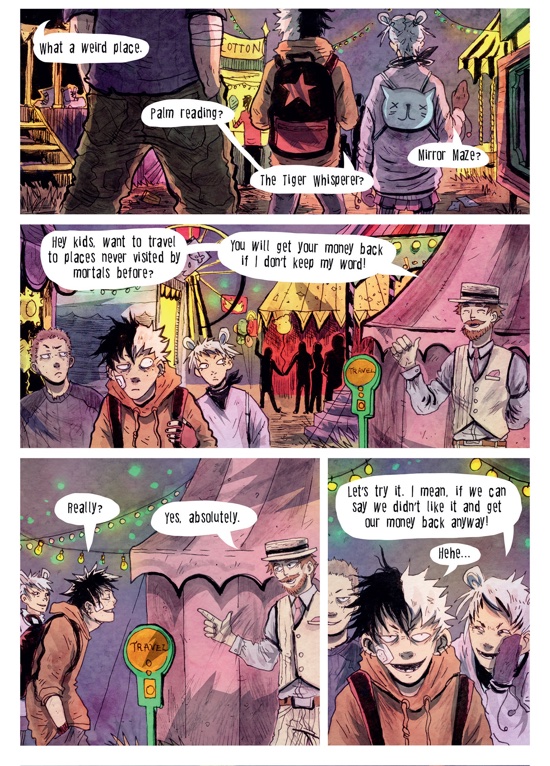
If you have any interest in UK small press comics and you don’t read Broken Frontier, you’re missing out on transmissions from what is in many ways the very epicentre of the scene. Once again editor in chief Andy Oliver has picked a fantastic selection of artists to feature. Pieces from his 2016 Small Press Creators To Watch are backed up by strips from a handful of the UK’s finest, including Behold!’s faves Danny Noble, John Riordan, Rozi Hathaway, Steve Tillotson and Tim Bird. You can probably see where I’m going with this.
If you know any of the artists here, you’ll recognise their pages instantly; it’s testament to the selection that there isn’t so much as a single generic panel in the book. Some pieces are quite personal, such as Ellice Weaver’s account of her daily routine. Others, like John Riordan’s, are more conceptual – he offers a series of full width images with a fair degree of ambiguity, leaving the reader to decide on how to connect them narratively. Kim Clements reclaims the title Lanzarote from Michel Houllebecq for a story about a cat, travelling in a somewhat different direction than he does. Rozi Hathaway provides a piece that opens up with a larger image at the end as much of her material does, making fantastic use of colour as it transforms. I particularly enjoyed Jay Levang’s tense yet funny story about bored teenagers at a fair, with notably fine colouring. Pete Redrup
Antoine Cossé – Showtime
(Breakdown Press)
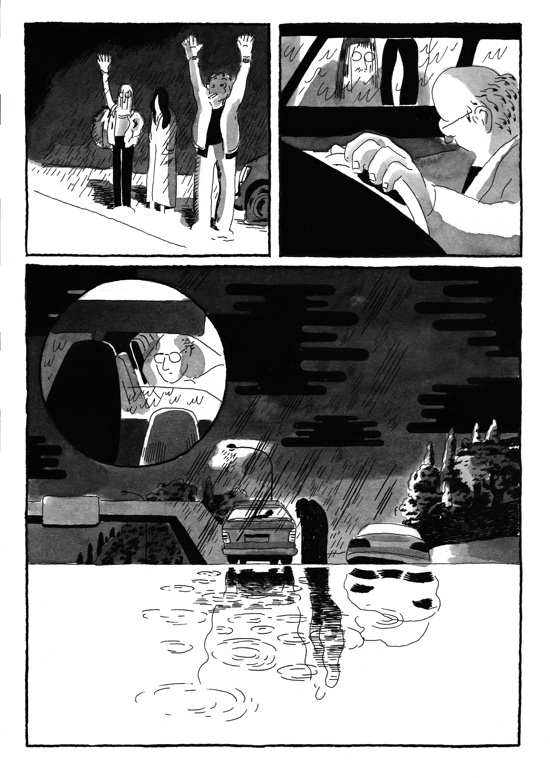
The only talk I attended at ELCAF was from Antoine Cossé, in which he described his working methods. Much of it focused on how he collected influences and arranged them around his workspace area, and reading Showtime I was reminded of this. There’s a fair degree of variety in the page styles he uses here and with his line, and yet the work is both coherent and consistent regardless of whether a page is empty except for a single image in the centre, or a densely packed, almost psychedelic collage.
The story of a famous magician called M, the narrative is assembled in such a way as to foreshadow some events, but in doing so perhaps obfuscates the bigger picture. It’s a cleverly constructed book incorporating a road trip, flashbacks, dreams and an introduction from a rat who at times appears to have large hands and who rearranges the scenery for us. Add to that an array of mysterious playing card imagery, pages full of angular geometric shapes and sweeping curves, and we are left with much on which to speculate.
At times Cossé produces a sort of smeared movement, as if the characters are pulling away and the world is being left behind. This adds to the general air of sleight of hand, as we ponder who is playing a trick on whom. Showtime is as well designed and tactile as Breakdown’s books so often are, a gentle pink hiding behind a bold dust jacket. This is another excellent work from Cossé, all the more satisfying for its length. Pete Redrup
Stephen Maurice Graham – Michael
(Space Face)
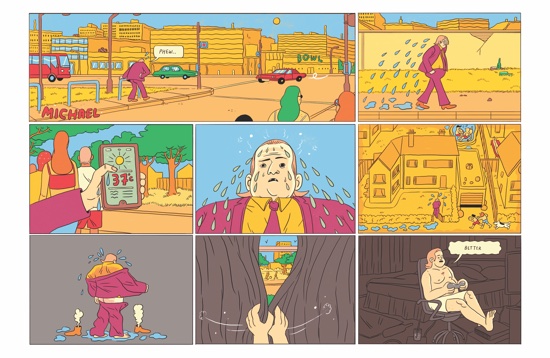
Stephen Maurice Graham’s Michael (that is a lot of first names) collects a bunch of strips about the character whose first appearances were in VICE. Michael, for those of you yet to make his acquaintance, is an adult avoiding adult life through video and role playing games, anime and collecting related ephemera. Look online and you’ll find lots of strips where he still lives in his parents’ basement. In this book he has managed to move out to his own place, but this is merely a brute fact rather than some signifier of progress in all areas.
Michael lives a rich fantasy life, frequently drifting into reveries lasting several panels before being unceremoniously hauled back to a reality some way from his dreams; when he wants a haircut like Taylor Hanson imagining the female attention which will result, only to find he’s paid £60 for a centre parting but remains otherwise untransformed. Indeed, this is one of his coping strategies, one he explicitly advocates to his colleagues. Michael is a type that is easy to skewer, but this doesn’t feel mean. Indeed, one assumes the author is reasonably knowledgeable about the cultural elements he mocks. He must have put a certain amount of time into playing video games and perhaps avoiding human contact. Obviously, the fact that I recognise many of the carefully crafted references indicates meticulous research on my part, rather than some sort of misspent and woefully extended adolescence.
Graham has produced a very funny book with obvious appeal for those (ahem) demographically aligned. Pete Redrup
Josh Hicks – Human Garbage
(Good Comics)
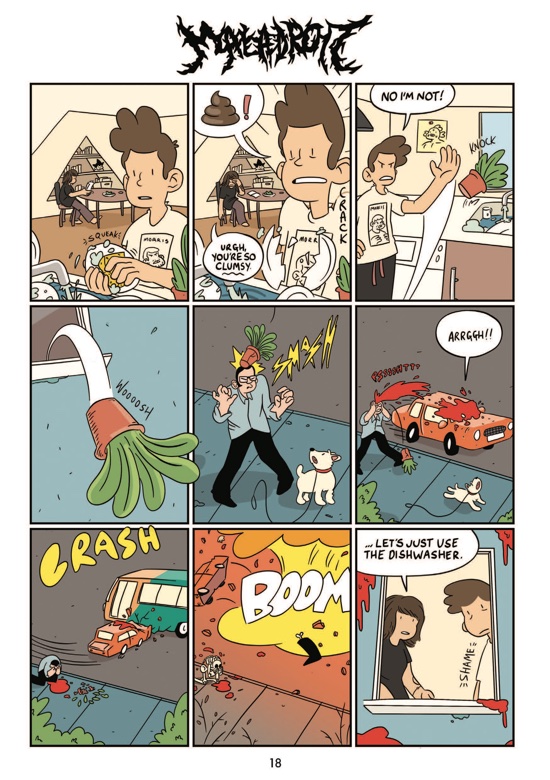
Launched at ELCAF this summer, Good Comics collect several stories from Josh Hicks in this volume, a mixture of old, new and remixed. A heavily wrestling-themed intro from Robin William Scott is fulsome in its praise, and although the risks with this are obvious, the strips that follow comfortably manage to live up to the fanfare.
Club is well observed, likely to strike a chord with those for whom nightclubs are perhaps not where they feel most comfortable. Hicks shows an eye for detail: the identikit clothing, such as the checked shirt being worn by all the men, the inability to hear conversations, dealing with awkwardness by pointlessly checking a phone, and something I didn’t notice at first, the pages are formatted to show a phone signal and declining battery level at the top, a neat metaphor for the experience of being out but not really into it. Another standout is The Case Of The Black Cat, an amusing noir with droll punchlines and very effective two colour art, one of two longer stories here.
We are left with the knowledge that Hicks is a talented, funny cartoonist. It would be great to see a long form work from him next. Pete Redrup
Ellice Weaver – Something City
(Avery Hill)
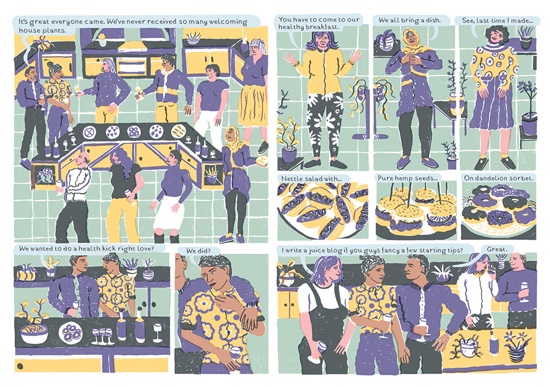
This book from Ellice Weaver and Avery Hill combines such a joyful mix of structure and anarchy, there’s a lot to be impressed with. It contains ten stories, each exactly five pages of comic and one page of isometric neighbourhood-scape, each made up of a different three colours (plus black and skin tones) and each a witty microcosm of human foibles. It’s a piece of art wisdom that the best work comes from playing organically within rigid rules, and I think that’s how this book must have come together. While the stories engage with very different communities and characters there are points of overlap and even a handy colour coded chart at the back telling you how each person relates to their fellow protagonists; it takes to a colourful extreme the idea that thoughtful city dwellers must constantly be aware of – these thousands of strangers that I pass must have stories to tell, might have interesting lives, or at least comically petty grievances. Here Weaver has been able to dive briefly into the lives of self-destructive youths, criminals, victims, nudists (when I say she really likes drawing naked people, I mean, I think she does, but not like that) cheats, liars, Mormons and perhaps most bizarrely, a community of people who hide their face in public and only communicate through software that visually enhances their beauty. With all of that it sounds like it could easily be one of those bleak, cynical comics that you regret buying because now you feel sad about the world. But it never is that, all of these flawed characters are sympathetic and relatable even within five pages. As I said – very impressive. The art style probably lends a lot to that mood, combining simple shapes and colours with beautifully seen body language and detail. I could have lived without the two filler pages of local news and advertorials in the middle, which lacked the wit of the stories themselves – this kind of device needs to be razor sharp to be worth including in my opinion, but I couldn’t finish Jimmy Corrigan, so I’m probably not the best person to judge. I would definitely recommend picking this book up in any case as you can always skip these pages without losing the joy of the narratives. Jenny Robins
Mike Medaglia – Poverty Of The Heart and Rushing from A to A
(self published)
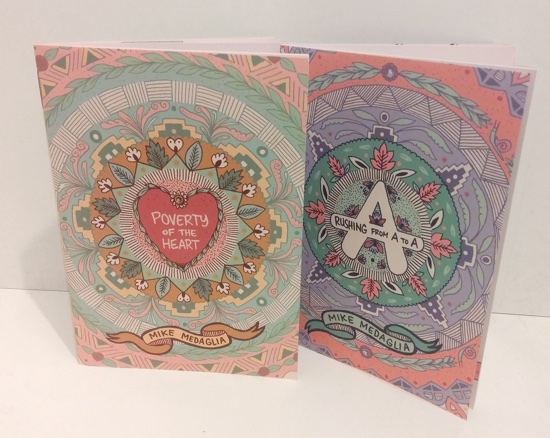
Mild mannered Zen Buddhist superstar Mike Medaglia has been delighting viewers with his candy pastel hued, beautifully illustrated axioms and snippets of life advice in many formats for some time. His One Year Wiser books with SelfMadeHero being the chunkiest, although his webcomics with Huffington Post and Elephant Journal and indeed his Instagram feed offer bite size nuggets of zen which are not to be missed. Now he is producing a series of self-published mini comics expanding (with great economy of word and line) on simple themes of mindful living. It’s a good length to explore a simple concept thoroughly. I like how the titles sound really quite grim whilst looking ever so pretty, but the books are actually advice on how to avoid those prognoses. Poverty Of The Heart is all about how to fill your heart with love through compassionate acts, and Rushing From A To A is about how to chill out and be less obsessed with goals and success. Although I assume Mike must have to be somewhat goal oriented to be able to create such regularly occurring work and meet publishing deadlines, his mindfulness must also be of great use in being able to write on the topic without sounding preachy. Whether you subscribe to kindness and rose sniffing but need a little reminder now and then, or swear off schmaltz completely and pride yourself on your go-getting hard heart, you’d be hard pressed to not find these little books at least a little charming and illuminating.
You can pick up both zines for £3 each, along with lots of lovely prints, here and follow Mike on Instagram for injections of zen here. Jenny Robins
Tor Freeman – Welcome To Oddleigh Vol 2: Return To Oddleigh
(Self-published)
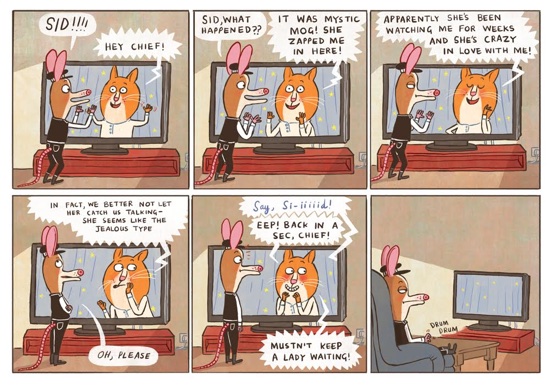
If Zootopia was a lot more like Hot Fuzz with a helping of Dr Seuss on the side, you might be half way to Tor Freeman’s tales of Oddleigh. Her protagonists Chief Inspector Jessie and Sergeant Sid are a dog and cat police team (probably), who are hot on the trail of very unlikely assailants. One of them is Mystic Mog, who sucks prospective lovers into the television late at night, a telepathically talented and murderess laundress and, via a convoluted tourism scheme, more or less the entire nation of Australia. The dialogue is delightfully dry and combines suburban and surreal perfectly. Freeman’s art is as expressive and polished as you’d expect from her healthy pedigree in children’s books but this is definitely a fully realised comic and makes smart work of the medium. The real joy of this book for me was in the expressions of the characters – especially the incidental ones that include a wide variety of different animals and professions. Nods and references to popular culture are knowingly employed, but you won’t miss out if some of them pass you by (there are many adults alive now who don’t remember Mystic Meg, my crystal ball tells me) although there’s a chance you may be offended if you are Australian.
Check out more of Jessie and Sid’s adventures at the comic’s Tumblr. Jenny Robins


